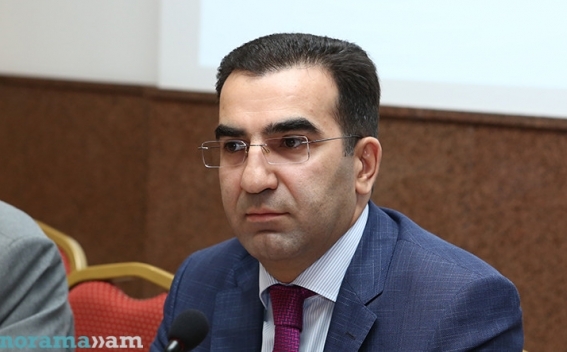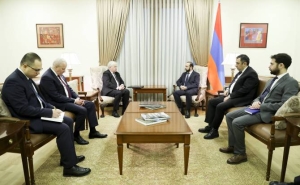The Number of GSP+ Users in 2016 Has Increased: Garegin Melkonyan (EXCLUSIVE)

ʺArmediaʺ IAA presents an exclusive interview by with Garegin Melkonyan, First Deputy Minister of Economic Development and Investments.
- Armenia joined the GSP privilege system in 2006. In December 2008 Armenia was granted the right to use the EU Special GSP (GSP +) for sustainable development and good state governance, as defined by the EU GSP 2009-2011 Regulation. How would you evaluate Armenia-EU cooperation within the GSP + privilege system? And how effectively does the Armenian side use this system?
- Armenia has applied in order to use the GSP+, because according to the GSP+ procedure, unlike the GSP one, the countries should apply if they are interested. There are certain preconditions for applying mainly based on the 27 planned international conventions and in order to apply the country should first of all prove that it has joined all those 27 conventions.
The legal basis of the GSP+ system has been updated over time, the regulations have been re-established by the European Commission and the current system is valid from January 2014.
The system unilaterally envisages a zero duty rate of about 6200 types of goods for beneficiary countries, including Armenia, if the goods comply with certain criteria, i.e. have a certificate of origin, is considered to be manufactured in the beneficiary country, and so on.
The evaluation of effectiveness or usability level of this system is also carried out by the European Commission, from time to time referring to all nine beneficiary countries, evaluating their degree of usage, the tendencies, and so on. Let me note that Armenia's level of utility is quite high. during 2016, goods exported from Armenia to the EU which could use the GSP+ benefits, 82% of them, was actually used. In general, they make about 40% of our export. It's about 10% higher than last year's data.
In general, the system works quite effectively. According to the European Commission statistics, thanks to GSP+, Armenian organizations have not paid for about €10 million of customs duties. This means that the private sector has saved this money and can spend it on its business development, thus making Armenian products much more affordable in the European market.
- Is the awareness of this privileges system at a satisfactory level? What measures do we need to take in order to ensure more active involvement of Armenian businessmen?
- Awareness is the question that you can always talk about. Even if we talk about it every day, there may always be organizations that are relatively less aware. It will never be possible to have a situation that we consider satisfactory and do not need to talk about it any longer. We have put emphasis on media coverage, as well as in the recent years almost at all business events, business forums and roundtables, we have been speaking about this system, informing, prompting and welcoming organizations to be aware and to use it. This year, several events were also held, even when the GSP+ professional team of the fact-finding mission of the European Commission was here, we held another event specifically targeting the private sector by inviting representatives from more than 100 organizations from the Chamber of Commerce, Businessmen's Unions, News services. Together with representatives of the European Commission, we had a very detailed, even somehow technical presentation on what you need to know about the system. If I make a general comment, a great work has been done in terms of spreading information, and this question still remains on our agenda, and we will periodically talk about the system in order to ensure that our businessmen remember that there is such a possibility and they themselves can make use of it.
- In your speech, you mentioned that you notice a growing interest. Can we say that there is an initiative by the private sector?
- In 2016, about 640 companies used the export within this system. If we look at the annual indexes of previous years, at least with 10% we have not only the level of usability, but also the increase in the number of users. This means that more companies have learned about the system and have been able to use it. I think that the annual figures for 2017 will be even greater in terms of the exportability and the number of involved companies.
- The report on fulfillment of the commitments undertaken by Armenia within GSP+ is expected in January 2018. What kind of estimates do you expect?
- I have mentioned that by joining the system, we periodically had a dialogue with representatives of the European Commission in terms of presenting information about the work done on conventions. So far, we have submitted four annual reports to the European Commission and the upcoming report is not the first one.
How does the system usually work? Working with all the beneficiary countries, a list of issues of particular interest that may vary is formed and sent to the countries, expecting the country's response to the work done in that respect. The list of questions may be about legislative initiatives, statistical data related to legislative enforcement and so on. Our reports sent in the recent years have been highly appreciated. In addition to our reports, we had discussions in the format of video conferencing, expert meetings, and in general, accountability was considered as a good example by the European partners, as some other GSP+ beneficiary countries have even been encouraged to study Armenia's example and to present their own reports based on our example as the most successful one.
The work is continuous, and we, of course, carry out a rather extensive work in between the reports, because the commitments and the decisions taken are not a one day job. We will summarize all the information by the end of the year, we will present the report and continue working on the basis of it.
- Mr. Melkonyan, a new legal framework agreement between Armenia and the European Union has been pre-signed this year. What will this new agreement give to the Armenian economy and to Armenia-EU relations in general?
- Before referring to the framework agreement, I would like to mention the REX system, which is relatively a new one, and we started talking about it only during the last few weeks. Armenia and the European Union in the context of the overall joint work carried out decided that Armenia will join the REX system in January 2018. What does this mean? In order to use GSP+, our local organizations will be able to sign up for an electronic system and after the next registration they will no longer need to obtain a certificate of origin and can export goods to the EU, use GSP+ zeroed customs duties rate without certificate of origin. This would mean doing fewer steps and spending less money for the certificate. By the end of the year, we will talk in more detail about whom to apply, how to register and so on.
As for the Framework Agreement, the most important priority or assessment I would make to the agreement is as follows: this new negotiated document should first of all be viewed in the context of the long-term development of our relations. The document is very extensive, involves a large number of spheres and directions in the Armenia-EU relations, development agenda, joint work, and it also outlines the format and directions of cooperation between the parties for the upcoming years. Of course, this is very important because the agreement, which operates between Armenia and the EU, was signed in 1996. In other words, we are updating the document aged more than twenty years. It is based on approaches that are consistent with time requirements, as well as the readiness of the parties to deepen the relationship. I am sure that from the long-term perspective it will have a very positive impact not only on the development of the EU-Armenia relations, but also on the implementation of European experience here in many spheres.
Other materials on this subject
- Armenia gets highest growth projection by World Bank among European, Central Asian countries Regarding other regional countries, the World Bank projected Azerbaijan’s 2022 growth at 4,2%, Georgia at 10% and Turkey at 4,7%.
- IMF staff reaches staff-level agreement with Armenia on precautionary Stand-By Arrangement The proposed arrangement will support the government’s economic program to achieve investment-driven, knowledge-based, and export-led growth, while preserving macroeconomic, fiscal, and financial stability...
- Over 1 trillion in taxes paid by 1000 top corporate taxpayers in 9 months The top 1000 corporate taxpayers paid a total of more than 1 trillion 82 billion 627 million drams in the reporting period.
- S&P Global Ratings reaffirms Armenia’s sovereign ratings with "stable" outlook According to the statement, the stable economic growth of Armenia, the decline in geopolitical risks, the strengthening of Armenia’s external position and the slower rate of foreign debt accumulation...
- EBRD Raises Growth Forecast for Armenia’s Economy for 2022 In its latest Regional Economic Prospects (REP), the EBRD said that the economies of Armenia, Azerbaijan and Georgia are enjoying some of their highest growth rates in years.
Other materials on this subject
- EU Fully Supports Normalization Process of Armenia-Turkey Relations - Toivo Klaar "Normalization of relations and opening of communications is an important objective that the European Union fully supports", he said on Twitte
- The EU Wants To Be Engaged In South Caucasus The EU wants to be a very committed, active, and engaged partner for Armenia's stability, prosperity, and security. In this context, we had the opportunity to talk about Armenia-EU relations
- The 6th Meeting of the Armenia-EU Joint Visa Facilitation Committee Took Place The importance of the continuous mutual efforts aimed at promoting the mobility of citizens, fighting illegal migration and opening in due course the Visa Liberalization Dialogue has been underlined.
- Export From Armenia To The EU In 2019 Was 196.6 Million EUR Armenia has the highest percentage of the use of the preference among all the EU GSP+ beneficiaries in 2019, EU delegation in Armenia informs.
- Austria Completes Internal Procedures Necessary for Ratification of Armenia-EU CEPA Austria notified on July 22 the General Secretariat of the European Council and the Council of the EU about the completion of its internal procedures necessary for the ratification of the Armenia-EU Comprehensive...
-
 17:08
17:08The regular session of the Anti-corruption Policy Council takes place in Jermuk
-
 15:05
15:05The Prime Minister sends congratulatory messages to the supreme leader of Iran and the President of Iran
-
 11:11
11:11Armenia sends earthquake aid to Turkey
-
 10:43
10:43Commemoration of the Pontiff St. Sahak Partev
-
 09:16
09:16Some roads are closed and difficult to pass in Armenia
-
 19:55
19:55Phone conversation of the Foreign Minister of Armenia with the U.S. Assistant Secretary of State for European and Eurasian Affairs
-
 18:30
18:30Prime Minister Pashinyan and President Khachaturyan meet
-
 18:20
18:20Ararat Mirzoyan with Co-Chairman of the OSCE Minsk Group of France Brice Roquefeuil
-
 17:01
17:01Humans could land on Mars within 10 years, Musk predicts
-
 16:45
16:45France, US urge 'immediate' end to Nagorno Karabakh blockade
-
 16:01
16:01Blockaded Nagorno Karabakh launches fundraiser to support quake-hit Syria
-
 15:59
15:59Earthquake death toll in Turkey rises to 18,342
-
 15:43
15:43Ararat Mirzoyan Held a Telephone Conversation with Sergey Lavrov
-
 15:06
15:06French president rules out fighter jet supplies to Ukraine in near future
-
 14:47
14:475 Day Weather Forecast in Armenia
-
 14:44
14:44President Vahagn Khachaturyan wrote a note in the book of condolences opened in the Embassy of Syria in Armenia
-
 14:20
14:20Azerbaijan’s provocations impede establishment of peace and stability – Armenian FM tells Russian Co-Chair of OSCE MG
-
 12:57
12:57France representation to OSCE: Paris calls on Azerbaijan to restore freedom of movement through Lachin corridor
-
 11:40
11:40Command of Kosovo forces highly appreciated preparation of Armenian peacekeepers
-
 10:16
10:16The United States withdrew from sanctions against Syria for six months the provision of assistance after the earthquake
day
week
month
Humidity: %
Wind: km/h









